- Home
- Janelle Taylor
Defiant Hearts Page 6
Defiant Hearts Read online
Page 6
“Meade won’t make a difference down my way, not with more troops coming in soon. I just got a big order for thousands of tents and bedding to supply our boys. I was told to have them delivered by the eighteenth. Looks to me as if things are about to get noisy and busy in my area. About time our side started attacking and stopped just defending and tightening ranks.”
Orville added, “That must be why I was asked to loan the R&P Railroad five empty cars on the eighteenth.”
“You mean nobody explained why they needed them?”
“Not a word, Frank, so maybe it’s supposed to be a secret.”
Major Stevens said, “Perhaps that’s why this topic should be dropped, gentlemen; we wouldn’t want the wrong ears hearing such news,” and Orville agreed.
Laura asked, “Does anyone want any more coffee or dessert?”
Jayce responded, “I’m finished, Miss Carlisle, so I’ll leave you ladies to tend your chores. I’m sure you’re tired after a long and busy day. Gentlemen, shall we all retire to the parlor?”
“Thank you, Lieutenant Storm, that’s very considerate of you,” she said without meeting his gaze, afraid hers would betray her emotions.
The men left the room, and the three women began their tasks.
* * *
When Jayce joined her, Laura was standing on the second-floor porch and looking toward the James River as the sun set behind the hotel. After checking the water closets to see if they were tidy, she had stepped outside to strengthen her willpower before going downstairs and facing the very temptation who was approaching her. Normally a lady wouldn’t be alone with a near-stranger, but these were not normal times and she was no longer a proper plantation mistress and southern belle who practiced strict etiquette. Even so, she cautioned herself to behave wisely with him.
“It’s a lovely view and time of day, isn’t it?” he murmured as he gazed beyond her, but he was fully aware of her presence, perhaps too aware. He wouldn’t be in Richmond for very long, but he couldn’t seem to stop himself from trying to get to know her better. It was as if something drew him toward her.
“Yes, it is.” Laura struggled not to look at Jayce and to keep her wits clear. Who, she mused, was he? What did he want from her? Why had he sought her out this evening and why had he asked to spend time with her tomorrow? His questioning voice broke into her thoughts.
“Was Richmond very different before the war intruded on her?”
Laura responded as if the location were feminine, as he had done, “She was quieter and less crowded, even with many visitors in town. Streets are no longer filled with well-dressed couples taking strolls; they’re overflowing with soldiers in dull uniforms who always seem to be in a rush. Soft talk has been replaced with loud voices, jangling swords, and heavy hoofbeats. Smiles are few and strained, but there are frowns and grimaces aplenty. It’s like watching the genteel South vanish before one’s eyes. I suppose war changes everything and everybody to some extent.”
“Some more than others from what I’ve witnessed in the past three years…How long have you run this place alone?”
“Since Aunt Clarissa died just over a year ago, in May of’63, and left it to me. She was a very special lady, and I still miss her terribly.”
Jayce propped his left shoulder against one of the posts. “What happened to your family, if that isn’t being nosy or forward?”
“My mother died when I was just one year old. My father and brothers marched off to war when it began and they were…They’re gone now.” She halted short of lying to him, but used a sad expression and tone to imply they were killed. “What about your family, Lieutenant Storm?”
“I’m sorry about your losses; it must be hard on a young woman to be left alone, particularly during such difficult and dangerous times.”
“Thank you, Lieutenant Storm; that’s very kind of you. Fortunately, I have friends, a home in a safe city, and a way to support myself. I know that isn’t true for many women on distant plantations and farms or in towns that have been attacked or captured by the enemy. I think it would be frightening to live in areas where skirmishes are taking place, to have foragers stealing the food my children need, to be looting my property, and sometimes camping in my yard or confiscating my home for headquarters. So many horrible things are being done on this vile quest for victory.”
“Sadly, you’re right. I’m trying my best to help end this tragedy as soon as possible so our country can get on to peace and recovery.”
“I’m sure you are, Lieutenant Storm, and we’re grateful to you.”
“Would it be too improper if you called me Jayce, at least in private? Being called Lieutenant Storm keeps me thinking about the war. For a few days, I’d like to forget what’s ahead of me. I’ve already witnessed more than anybody’s fair share of suffering and death.”
“I suppose that’s all right, but only in private. You may call me Laura when we’re alone.”
“That’s a beautiful name for a beautiful lady, if I may say so.”
“Thank you, and I think you just did.” She heard Jayce chuckle. “Now, what about your family?”
Jayce glanced down at Fifth Street as he answered, “As I said at supper last night, I’m from Missouri, but my family’s gone now. War has a nasty way of demanding a lot from people.”
When he didn’t continue with more facts, Laura tried to garner clues by venturing, “There’s been a great deal of fierce fighting in that area, in Missouri and in Arkansas, according to the local newspapers.”
Jayce propped his buttocks on the white railing and a shoulder against a post to lessen the distance between their heights, as she was some eight inches or so shorter than his six-two frame. While she was talking and he was changing his position, he studied her. Her eyes reminded him of lush spring grass after a nourishing rain; her long hair, of ripened wheat. He could imagine how silky her soft and flawless fair skin would feel beneath his hand. He had no doubt she was well-bred, educated, intelligent, and refined; and he wished he knew more about her background. The condition of her hands told him she did as much work as those she employed, which impressed him. There was a strength, mingled with gentleness, about her which appealed to him. Though she was genial and polite, she appeared tense and alert around him, wary of him, and—unless mistaken—just as drawn to him as he was to her. Suddenly he realized she was waiting for him to speak. “We don’t get much news of other places on the battlefield,” he said quickly. “I guess they don’t want the boys distracted by worries about their families and homes; a lack of attention can get a man and his company killed. Do you remember anything you read or heard about Missouri? I have, or had, friends there; for all I know, they could be gone by now, moved or killed.”
Laura was touched by his somber expression and tone; they confirmed her opinion he was a man of deep feelings. “After the Battle of Manassas,” she began, careful not to call it “Bull Run” as the North did, “General Fremont took command of the Union forces in St. Louis and the northern section. The Confederacy seems to be holding on to the southwestern area. The papers say Rebel guerrillas are giving the Yankees plenty of trouble. There’s been so much fighting in every southern state that I can’t recall town names or battle sites or who won any skirmishes. But it’s my impression that the Yankees pretty much control the Mississippi River and its surroundings. You can check with the Confederate Reading Room on Main Street to see if they have any old newspapers with more detailed accounts of what’s been happening in your area since you left there.”
“I did stop in there and enjoyed some current newspapers and magazines. That was a rare treat.” Jayce smiled at the memory. “The boys at the front lines would be grateful for some copies of that Southern Punch; they don’t get many laughs in those entrenchments.”
“You like to read?” she asked.
“Yep, ever’ chance I get. What about you?”
“Yes, particularly novels and poetry by English or American authors.”
“Suc
h as?” he coaxed, and watched her respond without delay.
“Dickens, Brontë, Hawthorne, Whitman, Tennyson; those are a few of my favorites.”
“The Brontë sisters will be big losses to literature, so will Hawthorne. Did you know he died in May? I saw it in one of those magazines. My mother started me pleasure-reading when I was a boy; she gave me a copy of The House Of The Seven Gables for my seventeenth birthday.”
Those clues told Laura his mother had been alive in ’51 when Jayce was seventeen, which would make him thirty years old if his ’64 birthday had passed. She tallied their age difference: nine years. It seemed strange for her to be interested romantically in a man who was that many years older than she was. His remarks proved he hadn’t lied about being a reader to impress or delude her. “I, for one, shall miss Hawthorne’s work greatly.” She laughed and added, “Yankee or not.”
She savored the rich sound of his chuckles as he nodded, then asked, “What did you do today? You were out when I returned this afternoon.”
“Lily—she’s the one with pale-blond hair, and my best friend—she and I went over to Robertson’s Hospital to roll bandages, mend torn shirts and pants, write letters for soldiers with injured hands or arms, and to carry them treats—some of Mrs. Barton’s biscuits with preserves and dried fruits.”
“I bet those boys are mighty grateful to see your pretty faces.”
“They give us small gifts they’ve made, mostly things they’ve whittled. We have them displayed on shelves in the corner cabinets in the parlor. I was told Mrs. Davis, the President’s wife, has hers exhibited on a mantel in the formal parlor at the White House.”
Jayce wondered if her last sentence meant she had never been a guest at the Davis home. “Richmond certainly has plenty of hospitals to keep generous and kind-hearted women like you and Miss Lily busy.”
“Yes, we do. Judge Robertson loaned his house out to be used for as long as it’s needed. Sally Tompkins runs it, partly using her own money I was told. It has a reputation for being one of the best hospitals anywhere. Rumor is that injured men will do, say, or pay about anything to be sent to her. Some of Richmond’s most elite ladies perform daily tasks for Sally, so Lily and I only work there on occasion.”
“Why is that?” he inquired, then wished he hadn’t.
“Mainly because other hospitals need us more, those where finicky ladies won’t enter or swoon easily because of the sorry conditions.”
“Sounds similar to the one I was put in when I was gunshot. I’m lucky that ball passed clear through and my wound didn’t get infected, even luckier I had a skilled and patient doctor who didn’t saw my arm off before he gave me a chance to heal. Some of those docs are too quick and eager with their knives, and some aren’t qualified to be cutting on anybody.”
“You’re right.” Laura wondered why Jayce was a Rebel and why a man like him would fight for a lost and misguided cause. What kind of man truly lurked beneath that handsome and virile facade and easygoing manner? “It’s almost dark so I need to get inside and help the other women with my guests. It’s been pleasant chatting with you, Jayce.”
“Been mighty pleasant talking and relaxing with you, Laura. I look forward to another refreshing conversation tomorrow during our outing.”
As she reached the multi-glassed door and had a view of the staircase down the hallway, she saw Belle approaching Room A with a local patron. She distracted and delayedJayce by saying, “I forgot to ask what religion you are. I attend the First Baptist Church on the corner of Twelfth Street. Our pastor is Dr. Lansing Burrows and he’s quite excellent. But we have plenty of other churches and denominations if you prefer to attend one of them. President Davis and General Lee, when he’s in town, attend St. Paul’s Episcopal on Grace Street; Dr. Mennegerode is its rector.”
Jayce had almost bumped into her when she suddenly halted and turned to face and query him, but he recovered his balance as he answered, “Your church is fine with me, Laura. When and where shall we meet?”
“At the stable behind my house at a quarter past ten. That will allow us time to get there and be seated before the service. Alvus always drives me in the carriage; it’s too far to walk, especially on a hot July day.”
“Suits me fine, Miss Carlisle,” he said with a grin. “Shall we?” he asked as he opened the door for her to enter.
“Thank you, Lieutenant Storm; you are most gallant.”
At the juncture of the two hallways, Jayce said, “I need something from my room, so I’ll be down shortly.” He walked in the opposite direction, not wanting to accompany Laura to the first floor and have the other guests wonder what they had been doing upstairs together for so long, as he had guessed the purpose of the small rooms marked A, B, and C, a fact Miss Laura Carlisle seemed to want to keep a secret from him. There were other things he wanted and needed to study, but he had time to do so, after they got better acquainted and he won her trust.
Laura found Lily in the kitchen fetching coffee and treats. “How is everything going in there tonight?”
“Fine,” Lily replied with a grin. “Did you enjoy yourself?”
“Yes, very much,” she admitted. “Did anyone notice my absence?”
“Probably, but nobody saw you on the porch with Lieutenant Storm except me, so your secret is safe.”
“You’re teasing me something fierce, dear Lily.”
Lily laughed. “Yes, but isn’t it nice to have fun for a change?”
“How can I possibly argue with such truth?”
“Don’t even try, Laura, or I’ll know you’re being dishonest.”
“If I’m not needed in the parlor, I think I’ll go home and tend to that matter I left hanging.”
Lily cautioned, “Be careful while it’s loose. And get plenty of sleep. You have a busy day ahead and you want to look your best.”
Laura smiled and nodded. “Good night, dear friend.”
“Good night, Laura. I’ll take care of everything and everybody for you.”
“I’m sure you will.” Laura left and headed to her bedroom to take care of a particularly dangerous task.
Chapter Four
Laura sat on the floor beside the hearth in her bedroom, the firescreen in position to be replaced in a hurry if anyone intruded on her. She wished the Union-enciphering disk was back in its hiding place in the cellar at the Southern Paradise, as it would be certain exposure for her to be caught with one. She had decided to use the word-substitution method instead and to make the message appear to be a shopping list if it was discovered and taken from her. The substitute words were simple to remember, especially since she had used them many times in the past: each city of importance had one, with peaches representing Atlanta, and cloth for Petersburg. Cotton stood in for divisions with the number of bales indicating their number, tobacco for brigades with hands—a bound bunch—used to reveal theirs, sugar for artillery with barrels to indicate heavy and sacks to indicate light, and flour for the departure schedule of troops with barrels as the month and sacks as the day.
With haste, but taking care to be accurate, Laura related that two divisions with seven brigades with heavy and light artillery were leaving on July nineteenth for Atlanta: she would exchange two bales of cotton and seven hands of tobacco for five barrels or fifteen sacks of sugar, seven barrels or nineteen sacks of flour, and all the peaches from the Deep South they could spare. She continued with one division with four brigades and with heavy and light artillery were departing for Petersburg on the same date, switching the word peaches for bolts of cloth.
Her work completed, she concealed the disk in the chimney until she could return it to the cellar in the morning and added the notes copied from Stevens to be burned tomorrow, as smoke rising from her chimney in July or smelling up her house in case a visitor called would be suspicious. She stood and adjusted the firescreen, making sure no telltale soot was left behind. She put the “trading list” in her sitting-room desk with business papers to make it appear innocent i
f sighted by the wrong person.
After a nightly routine of washing her face and plaiting her hair to prevent tangles, she slipped into a cotton shift and went to bed, careful to overlap a slit in the netting canopy which kept away mosquitos and other pests. She curled to her right side and took a deep breath. Her clothes, undergarments, and accessories for the next day were lying on the bed in the other room. She had selected one of her best outfits, a welcome gift from Clarissa: a vibrant peach flounced skirt with green lace edging three graduating-to-the-floor layers and worn with a fitted emeraldgreen bodice which had a strip of peach fringe and tassels that swooped over her breasts and around her shoulders. The top buttoned down the front and parted below her waist; its midelbow sleeves were split upward several inches and trimmed in braid. The full sleeves of a pale-peach blouse were visible and gathered at her wrists. Her kid leather shoes, worn with lisle stockings, matched the bodice’s color. She knew how she planned to fix her dark-blond hair. She would part it down the center, secure the tresses behind her head, and allow curls to dangle down her nape and peek from beneath a small green bonnet with peach ruching inside the brim. Gloves, a small reticule, and a parasol decorated with ribbons and swaying fringe would complete her Sunday attire. Charcoal tooth powder, to clean and whiten her teeth and sweeten her breath, was on the washstand in the hall water closet, as were her other grooming aids.

 Shadowing Ivy
Shadowing Ivy Chase The Wind
Chase The Wind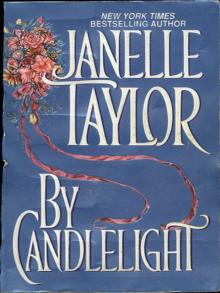 By Candlelight
By Candlelight Kiss of The Christmas Wind
Kiss of The Christmas Wind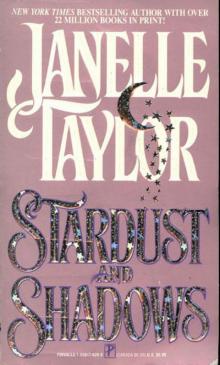 Stardust And Shadows
Stardust And Shadows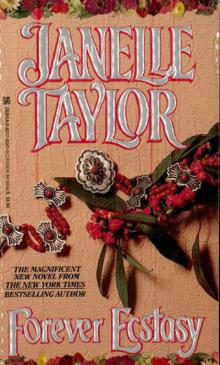 Forever Ecstasy
Forever Ecstasy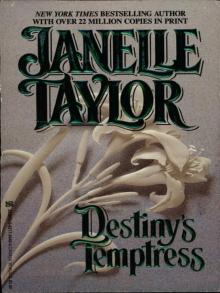 Destiny's Temprtress
Destiny's Temprtress Haunting Olivia
Haunting Olivia Wild Is My Love
Wild Is My Love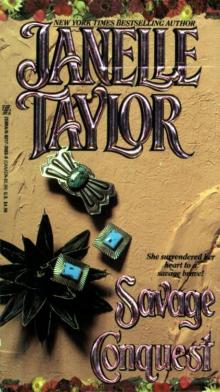 Savage Conquest
Savage Conquest Valley of Fire
Valley of Fire A Christmas Surprise
A Christmas Surprise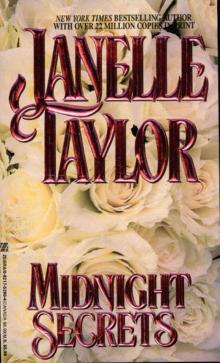 Midnight Secrets
Midnight Secrets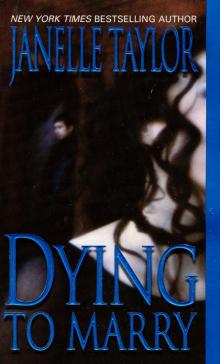 Dying To Marry
Dying To Marry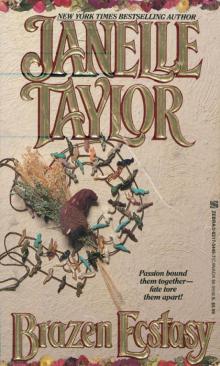 Brazen Ecstasy
Brazen Ecstasy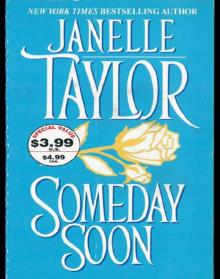 Someday Soon
Someday Soon Savage Ecstasy
Savage Ecstasy Can't Stop Loving You
Can't Stop Loving You Golden Torment
Golden Torment Forbidden Ecstasy
Forbidden Ecstasy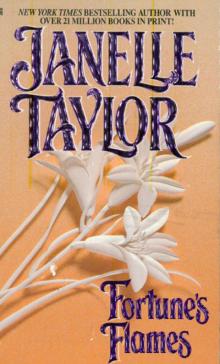 Fortune's Flames
Fortune's Flames First Love Wild Love
First Love Wild Love Follow The Wind
Follow The Wind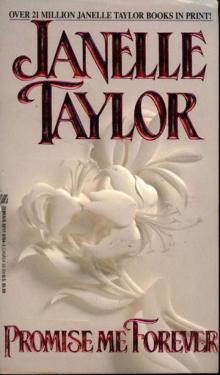 Promise Me Forever
Promise Me Forever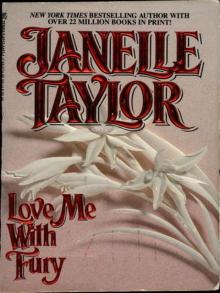 Love Me With Fury
Love Me With Fury In Too Deep
In Too Deep Lakota Winds (Zebra Historical Romance)
Lakota Winds (Zebra Historical Romance)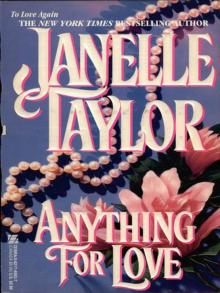 Anything For Love
Anything For Love Cherokee Storm
Cherokee Storm Straight From The Heart
Straight From The Heart Don't Go Home
Don't Go Home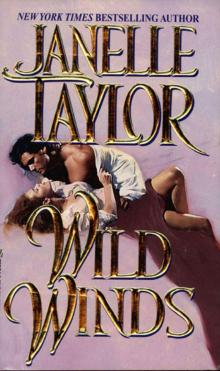 Wild Winds
Wild Winds Tender Ecstasy
Tender Ecstasy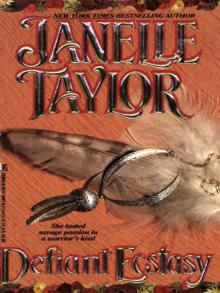 Defiant Ecstasy
Defiant Ecstasy Defiant Hearts
Defiant Hearts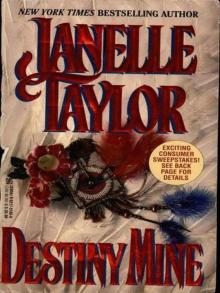 Destiny Mine
Destiny Mine Lakota Flower
Lakota Flower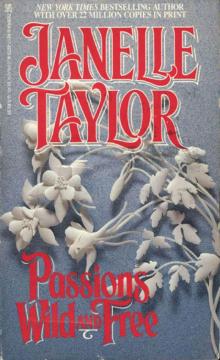 Passions Wild And Free
Passions Wild And Free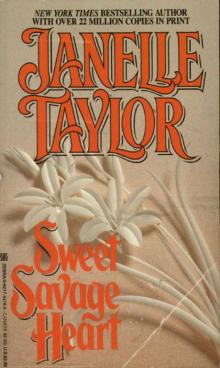 Sweet Savage Heart
Sweet Savage Heart Stolen Ecstasy
Stolen Ecstasy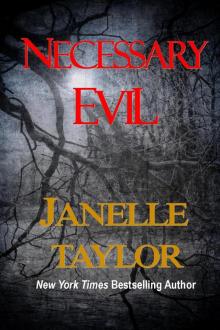 Necessary Evil
Necessary Evil Lakota Dawn
Lakota Dawn